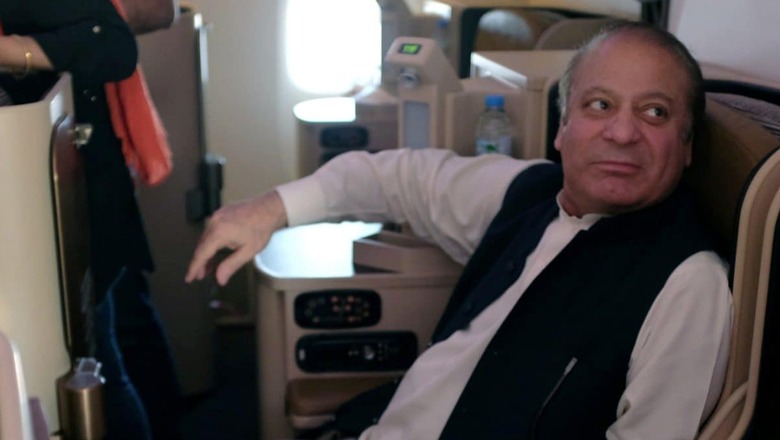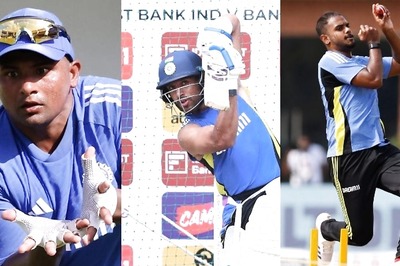
views
A shattered economy, with an unstable government mired in corruption, and involvement in terrorist activities in South Asia and beyond, Pakistan will go to polls on February 8 where 128 million registered voters will elect the members of the National Assembly, the country’s lower house.
Pakistan’s elections, which is allegedly interfered by the military, have had a history of being controversial, this time, with its former prime minister, Imran Khan, sitting in jail, while another, Nawaz Sharif, coming out of self-imposed exile.
Here is what you need to know about the upcoming elections.
Imran Khan vs Nawaz Sharif
Nawaz Sharif, who left for London in 2019 after the Pakistan’s Supreme Court barred him from electoral politics in 2017 over corruption charges in the Panama Papers scandal, is being seen as a key front-runner in the elections, hoping to join the office.
The three-time former prime minister, who never completed a full five-year term, is being favoured by the Pakistan’s military to be the next prime minister. Interestingly, corruption charges against Sharif subsequently dropped upon his return last year, and the ban on contesting elections was also lifted by the courts.
Sharif, however, used to have strained relations with the military during his third stint in office in 2013. His second term ended abruptly by a military coup in 1999.
His brother, Shehbaz Sharif, led the coalition government by Pakistan Muslim League-Nawaz (PML-N) after Imran Khan was removed from office in 2022.
Sharif’s arch-rival cricketer-turned-politician Imran Khan has been sentenced to 10 years in jail in a corruption case. Despite his supporters called the charges against him “politically motivated”, the Supreme Court nullified his party, Pakistan Tehreek-e-Insaf, intra-polls and stripped it of the ‘cricket bat’ symbol for the upcoming elections.
BBC, citing Gallup poll, has reported that Khan is the most popular leader in Pakistan today despite being out of the election race. Many of his supporters have alleged former Army chief Qamar Javed Bajwa behind Khan’s ouster in 2022.
Khan, who once promised to end dynastic politics in 2018, had faced allegations of media curbs, human rights violations and attacks against journalists during his tenure. The country’s economy began to collapse, and many opposition leaders were sent to jail when he was in office.
Khan and his wife, Bushra Bibi, have been sentenced to seven years’ of imprisonment by a court that ruled that their 2018 marriage violated the law.
His aide, Jahangir Tareen, is contesting the 2024 polls with his newly founded Istehkam-i-Pakistan Party (IPP). The sugar baron, also one of the wealthiest politicians in Pakistan today, Tareen has promised to deliver ‘Naya Pakistan’, according to Dawn. It is stated that Tareen has funded several of PTI protests and rallies, and is “viewed as someone who can buy influence”.
Bilawal Bhutto Zardari
Pakistan People’s Party (PPP), led by Bilawal Bhutto Zardari and his father, Asif Ali Zardari, is vying for power for the first time since 2008. The 35-year-old Bhutto scion will be competing in his second election. He was the foreign minister under PDM rule.
His party has promised to double wages, subsidies for the wealthy, budget through government cuts, all of this when the country is in dire straits. Political experts have given a thumbs down to PPP but have predicted that the party could be a kingmaker in a governing alliance this elections.
His party faces challenges such as governance in Sindh for the past four terms, and flooding in 2022, which destroyed much of the province.
Maryam Nawaz
Nawaz Sharif’s daughter is expected to take reins of the party and continue his political legacy. She may get a bigger share in the pie if PML-N and its allies come to power.
What’s in Store for the Next PM?
Reducing inflation, creating jobs for the youth, securing investment for Pakistan’s future are some of the immediate concerns the future leader of the country will have to resolve.
In terms of foreign affairs, the recent missile attack by Iran, targeting Jaish al-Adl terrorist group, have increased tensions between the two countries. Pakistan is also facing threats from terrorist attacks in Afghanistan, where Tehreek-e-Taliban Pakistan (TTP) wants to establish its rule in Pakistan.
Pakistan Demographics
The country of 241 million has 69 million male and 59 million female voters, who will exercise their power on February 8 at 90,582 polling stations. There are 5,121 candidates who either belong to the 167 registered political parties or are fighting as independents for 266 seats.
Most of the voters are aged between 18 and 35, comprising 44% of the national vote bank.




















Comments
0 comment